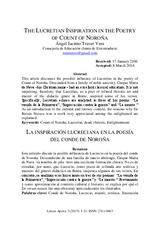La inspiración lucreciana en la poesía del Conde de Noroña
The lucretian inspiration in the poetry of Count of Noroña
Autor
Traver Vera, Ángel Jacinto
Editor
Cultural Association Littera ApertaFecha
2015Materia
Conde de NoroñaLucrecio
Muerte
Retórica
Ilustración
Count of Noroña
Lucretius
Dead
Rhetoric
Enlightenment
METS:
Mostrar el registro METSPREMIS:
Mostrar el registro PREMISMetadatos
Mostrar el registro completo del ítemResumen
Este artículo discute la posible influencia de Lucrecio en la poesía del conde de Noroña. Descendiente de una familia de rancio abolengo, Gaspar María de Nava -su nombre de pila- tuvo una excelente formación clásica. No es de extrañar, por tanto, que Lucrecio, como poeta de refinada arte retórica y maestro del género didáctico en Roma, inspirara algunos de sus versos. En concreto, se analizan ecos lucrecianos en tres de sus poemas: “La venida de la Primavera”, “Imprecación contra la guerra” y “La muerte.” Previamente y como aproximación al contexto cultural y literario, se explica por qué el De rerum natura fue una obra muy apreciada entre los ilustrados. This article discusses the possible influence of Lucretius in the poetry of Count of Noroña. Descended from a family of noble ancestry, Gaspar Maria de Nava ‒his Christian name‒ had an excellent classical education. It is not surprising, therefore, that Lucretius, as a poet of refined rhetoric art and master of the didactic genre in Rome, inspired some of his verses. Specifically, Lucretian echoes are analyzed in three of his poems: “La venida de la Primavera”, “Imprecación contra la guerra” and “La muerte.” As an introduction to the cultural and literary context, the reasons why De Rerum Natura was a work very appreciated among the enlightened are explained.

